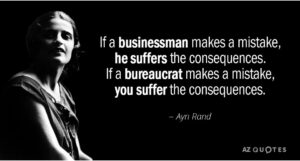In an item in the Guardian of 11 July, Miles Brignall, one of the paper’s ‘Consumer Champions’ took up the case of a reader who was being billed £2,250 for use of the Dartford bridge across the Thames. It turned out that “a new company – Conduent– had taken over the payments system in July, and it was in chaos”.
On its website, the company states that “Every day, Conduent delivers digital business solutions and services on behalf of our clients to create better outcomes for millions of people who count on them”. Not in this case, apparently, and National Highways, the owner of the bridge, was forced to admit that it “recognises that some have encountered technical problems and it has been acting quickly to solve these with the system supplier, Conduent.”
No suggestion there that Conduent executives, having abysmally failed to carry out the work they had bid for and been contracted to do, were going to suffer any consequences.
Rather frequently, and with no suggestion that any particular event has prompted them to do so, someone will post on LinkedIn a picture of Ayn Rand, embellished with a quotation. Figure 1 shows one of the favourites. As the thousands of motorists who received undeserved penalty notices from Conduent can testify, things don’t always work out in the way Rand claimed they would.

Figure 1. An Ayn Rand image recently posted on LinkedIn
The Dartford bridge affair is, of course, a relatively minor example. Many people were inconvenienced, and some probably paid penalty charges rather than face the time-wasting hassle of the appeal process, but nobody died. That is not always the case, as the ongoing Boeing saga demonstrates. The company recently agreed a $243.6million plea deal to avoid a criminal trial over the two 737 Max airliner crashes. Is this, then, a case of businessmen suffering consequences? The relatives of the 346 people who died because of what the trial judge described as ‘Boeing’s egregious criminal conduct‘ did not think so, and pressed for the deal to be rejected. Did they have a point? It would seem so.
According to a CNBC report, the take-home pay of outgoing CEO, Dave Calhoun, fell to $5 million last year after declining a bonus, compared with $7 million in 2022, As the report goes on to reveal, according to Boeing his total compensation for 2023 was $32.8 million, up from $22.6 billion. Even the company must have thought that this was difficult to justify, because, according to CNBC, it also said that “ it will tie more executive compensation to safety goals going forward”.
Not all of it, therefore, just ‘more of it’, even though outsiders might doubt that executives who presided over a corporate failure that resulted in the deaths of that many people, and who then showed so little concern for “safety goals going forward” that more recently a door blew off a Max 9 in mid-flight, deserved any compensation at all.
While contemplating this saga, I found myself wondering about the ending of another disaster, further back in the past but closer to home. What, I wondered, became of Fred ‘the shed’ Goodwin, after he so spectacularly crashed the Royal Bank of Scotland? Yes, he suffered for doing so; he lost the right to call himself Sir Fred Goodwin. However, the story has a happy ending, for him at least. His inflation-linked pension is now worth more than half a million pounds a year.
Those, Miss Rand, are the sort of consequences most of us would be delighted to suffer. What, we wonder, will be the consequences for the board and executives of Crowdstrike, the company whose software carelessness must have caused losses of tens of millions of individuals, well distributed around the world.
I’m not holding my breath.
